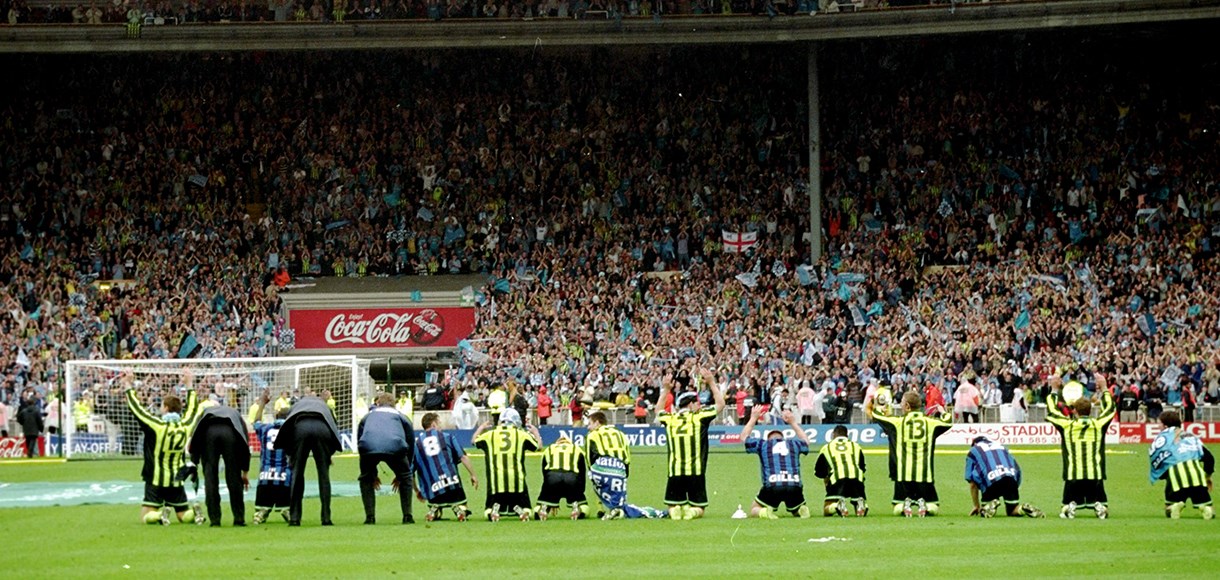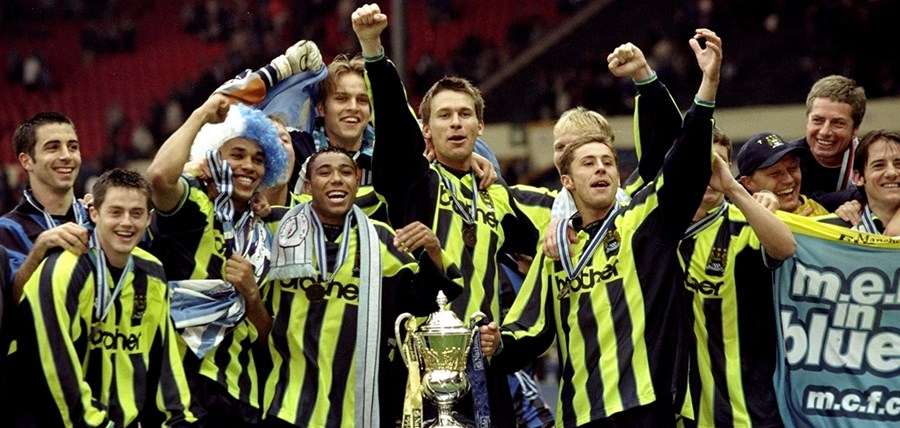The awful day I fell in love with Gillingham

Tom Clee was only eight years old when Manchester City pulled off the impossible in the 1999 Division Two play-off final, but it marked him for life.
"What team do you support?"
"I'm a Gillingham fan."
"Oh. Were you...?"
"Yes."
Sympathetic eyes and a knowing nod.
I've lost count of how many times I've had that conversation about the 1999 Division Two play-off final over the years.
It's remembered as a classic but, for those who aren't aware, here's a bit of context.
This was Manchester City's first and, presumably, given what has happened since, only season outside the top two tiers of English football.
In order to bounce straight back to the old Division One, they needed to beat Gillingham, who were making their first ever appearance at Wembley and had never played higher than their current level.
Having lost just two league games since Boxing Day, City were big favourites, but the Gills, managed by a young Tony Pulis, were a team on the up.
It would prove to be Pulis' last game in charge of the club, leaving under a cloud later that summer amid claims of blackmail and gross misconduct.
But not before he led out the team that he had guided from the bottom of Division Three to the brink of Division One in just four years in a smart, dark suit, which he quickly swapped for his now-signature tracksuit and cap.
The Gills took a late lead through Carl Asaba after 81 minutes, before ‘Super’ Bob Taylor – who moved to Maine Road the following season, where he ended up partnering Ballon d’Or winner George Weah up front – seemingly made the game safe on 86.
Kevin Horlock pulled one back with 17 seconds of normal time remaining, but all hope seemed lost until the fourth official held up his board to reveal five minutes of added time.
That was an abnormal amount back then, greeted by a gasp of "Would you believe it?" by Rob Hawthorne on Sky. Someone has since gone back through the game with a stopwatch and calculated that it should have been no more than four. But what does it matter now?
The ball was still deep in City's half as the clock ticked past 94, before one long ball, a flick-on and a fortuitous ricochet saw it fall at the feet of Paul Dickov inside the penalty area.
He and Gillingham goalkeeper Vince Bartram had been best men at each other's weddings, having spent a couple of years together at Arsenal, but that didn't stop him from firing into the roof of the net to take the game to extra time.
The Gills were shot, and sleepwalked through 30 more minutes before surrendering on penalties, scoring just one of their four, to send City keeper Nicky Weaver on a wild lap of honour as the rest of his teammates tried to catch him up.

I was eight years old at the time, and lived with my family in Oxfordshire, some 120 miles from Kent.
The Gillingham connection came from my mum, who had grown up in Rainham and started attending games with my grandad and my aunt after first going with school friends.
I'd been to my first game at some point during the mid-90s, before my grandparents relocated after retiring to be nearer to us.
We made the two-and-a-half-hour drive to Priestfield every now and again, but no more than we went to watch our local team, Oxford United.
I wasn't really interested in any of the big clubs, but I struggled to get too excited about Oxford when there was nobody to share it with. Essentially, I loved football but didn’t really have a team.
But that first trip to Wembley, on 30 May 1999, was a big deal.
The whole family went. Not just my grandad, mum, aunt and cousins, but also my nan, dad and uncle, who have never had the slightest interest in the sport.
There's a picture of us all together in a pub somewhere, decked out in jester hats and waving flags – I was eight, remember! – taken just before my youngest cousin managed to knock over a table full of drinks at “London prices”. We should have known that was a bad omen, even then.
This was the first ever sell-out for a Second Division play-off final, and the biggest sporting event that I'd ever been to. Gillingham took over 40,000 fans, more than four times the capacity of Priestfield.
I remember being amazed by the trails of familiar shirts on the escalators down to the tube, and kept trying to catch people's eye in the carriage in the hope of a nod of appreciation. "I'm one of you!"
This wasn't just some strange family tradition, after all. We were part of something bigger.
Wembley Way was like a circus. Everybody seemed drunk and, looking back, I realise that most probably were.
We walked past a well-known Gills fan, Big Nev, who, as his name suggests, was quite a large fellow. He was topless and had painted himself blue and, as I’d soon discover, had bought the seat next to me.
It's amazing which images your brain tucks away, and just how much passes you by.
I don't remember Russell Watson singing Nessun Dorma before kick-off, which is a shame, as it was one of my grandad's favourite pieces of music.
I do remember City's horrible, luminous yellow strip, and the haze of wispy smoke from the streamers that had greeted the players as they made the impossibly long walk from the tunnel to the pitch, which seemed to hang around until well into the second half.
Watching the game back is always fascinating.
Players lining up in numbers one to 11, only having three subs on the bench, and forming a guard of honour in front of the Royal Box for the national anthem. All strange little quirks that seem to belong to a time gone by, but that, as it turns out, I was just about a part of.
The game went past in a flash. I can't really recall our goals, but I can still hear the distant delirium on the other side of the stadium as we sat in silence after the equaliser.
The funny thing is, that Gillingham side wasn’t one to roll over. It was full of tough players who went on to become club legends. Our back five and goalkeeper racked up 43 years of service between them. Our midfield two enjoyed 18 more.
I still don't understand how it happened.

Afterwards, we made our way back to the New Forest, where we were camping at a resort called Sandy Balls, which is still funny now.
The weather was awful and we spent the following morning cooped up in a tiny caravan, with nothing to watch on a small portable telly other than the highlights.
I've got friends who have never watched it back, and still can't even reference it in conversation without shuddering.
But I have a different relationship with that match. Suddenly, I cared. I'd been through something that afternoon, and now football owed me.
The following season, we went to Oxford's old Manor Ground and, despite looking ridiculous in their yellow away shorts with blue-and-black striped shirts, this time I was rooting for the Gills.
By the end of the season, I was going to Wrexham away on the final day, where we missed out on automatic promotion, and stayed up late on a school night to listen to updates from our play-off semi-final against Stoke.
We ended up back at Wembley to play Wigan and, this time, I remember it all.
After trailing to a dodgy penalty in extra time, that same team came up with two goals in the final six minutes to right the wrong of 12 months earlier.
In the end, it didn't matter. Gillingham reached Division One for the first time in their history, where they stayed punching above their weight for five glorious years.
I've since seen three relegations, a title win and a last-minute winner in another play-off final at the new Wembley – all occasions that feel momentous at the time yet ultimately just end up punctuating the timeline of being a football fan.
But, for me, that infamous day under the Twin Towers in 1999 was when mine properly began.
Visit Betway's football betting page.





































